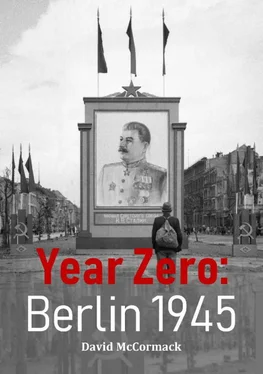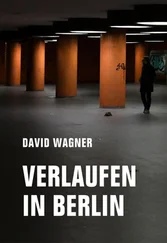As he gave me no answer, I knew the truth. It was natural that such an event was not discussed, and yet it affected us all very deeply, also that at such a time unimportant matters were of no interest at all. For, of course, we all believed that we, too, should not come out of this hell alive; we knew precisely what might be in store for us, everyone had made up his mind to that, there was no more question about it, we were paying attention to only what was essential.
Like those others trapped in the bunker, Nurse Flegel knew that the death of Hitler would not bring an automatic end to the horror. The advancing Red Army would want its revenge. In the ever shrinking last bastion based around the government district, desperate defenders fought on to delay the moment of reckoning. Meanwhile, final preparations for the storming of the Reichstag were complete.
The second attempt to fully secure the Reichstag and raise Red Banner No 5 was made at 18.00hrs. Yegorov and Kantariya were summoned by Zinchenko, who pointing to the roof of the building said, ‘Well then, off you go lads, and stick the banner up there’. Fighting in near darkness, the Soviet assault groups drew German fire, whilst the banner party made their way to the roof. Progress was slow, as determined German resistance showed no signs of slackening. Writing in the Soviet Voenno–istoricheskii Zhurnal in 1960, Neustroyev recalled the severity of the fighting:
Everywhere in the pitch-dark, smoke-filled Reichstag was soon confused and deadly. Knives and bayonets and rifle-butts were the weapons of those pitched medieval-style battles in the two side-chambers on the ground floor and on the main staircase. Then a grenade exploded, which blew to pieces Russians and Germans quite indiscriminately. There was a moments stunned silence… More explosions. Fire. Flames spread quickly over the plush furniture and wood panels and in some of the rooms actually stopped the fighting while men gasped for breath or desperately tried to stop their scorched uniforms burning…
It should therefore come as no surprise that it took the best part of five hours for Yegorov and Kantariya to claw their way to their final objective. At 20.50hrs, Red Banner No 5 was finally raised above the smouldering Reichstag, seventy minutes before Stalin’s deadline. Order No 6 of the 1 stBelorussian Front’s Military Council marked the significance of this great moment:
1. The Reichstag district in the city of Berlin was defended by crack SS units. In the early hours on April 28, 1945, the enemy parachuted in a battalion of marines to reinforce the defences of the district. In the Reichstag district the enemy resisted desperately, their troops having turned every building, stairway, room, cellar into strongpoints and defensive positions. The fighting within the main building of the Reichstag repeatedly took the form of hand-to-hand combat.
2. Continuing the offensive the troops of Colonel-General Kuznetsov’s 3 rdShock Army overcame enemy resistance, took the main building of the Reichstag and today, on April 30, 1945, raised our Soviet flag on it. Major-General Perevertkin’s 79 thRifle Corps and Colonel Negoda’s 171 stRifle Division and Major-General Shatilov’s 150 thRifle Division won particular distinction in the fighting for the district and the main building of the Reichstag.
3. Congratulating with the victory won, I commend all the men, sergeants, officers and generals of the 171 stand the 150 thRifle Divisions and the commander of the 79 thRifle Corps, Major-General Perevertkin, who personally directed the fighting for the daring they displayed, and skilful and successful fulfilment of their combat mission. The privates, sergeants, officers and generals who won particular distinction in the fighting for the Reichstag will be selected for government awards by the Military Council of the 3 rdShock Army.
4. The hour of the final victory over the enemy is nearing. The Soviet flag is already flying over the main building of the Reichstag in the centre of Berlin.
‘Comrade soldiers, sergeants, officers and generals of the 1 stBelorussian Front! Forward against the enemy – with our last swift blow let us finish off the Nazi beast in its lair and bring the hour nearer of final and complete victory over Nazi Germany.
‘The order is to be read in all companies, squadrons and batteries of the front’
Stirring words. However, raising the banner of victory did not in itself signal the end of the battle, as substantial numbers of German troops still held out in the basement. With complete victory over Hitler’s Germany imminent, the decision was made to sit on the German defenders holed up in the basement and wait until they inevitably saw sense and surrendered.
The suicide of Adolf Hitler left Goebbels as the senior political figure in Berlin. On his authority, plans for a break-out were cancelled and General Weidling was summoned to the bunker. After a difficult journey across Berlin’s moonscape, Weidling arrived at the bunker where he was met by Goebbels, Bormann and General Krebs. Soon after, he was notified of Hitler’s death which was for the time being to remain a secret pending negotiations with the Soviet forces in Berlin. The main thrust of these negotiations would be to buy time in order to bring Hitler’s political testament into force by means of Soviet recognition of the new Doenitz administration.
Lieutenant-Colonel Seifert (commanding Sector Z of the Berlin defence zone) was empowered by Goebbels to to make contact with the Soviet command in Berlin in order to make arrangements for General Krebs to discuss a request for an armistice. At 23.30hrs Seifert crossed the suspension bridge over the Landwehr Canal, carrying with him a packet containing papers for the attention of the Soviet command. Seifert explained his mission to Lieutenant-General V.A. Glazunov (commander of 14 thCorps). Wasting no time, Glazunov contacted General Chuikov to inform him of this startling development. Chuikov had been enjoying a rare moment of relaxation in the company of the war correspondents Vsevolod Vishnevsky and Konstantin Simonov, the poet Yevgeniy Dolmatovsky and the composers Tikhon Khrennikov and Matvei Blanter when the call came. He instantly recognised the importance of this historic development, issuing orders for a ceasefire in the sector designated for the German envoys to cross. Chuikov set off for his command post, and once there, waited. As he did so, he ruminated on the past:
Through my mind flash recollections of days and nights of battle from all four years of the war. Episodes then lived through pass before my eyes. There it lies, our Volga, distant now yet at the same time so close; over it spreads the burning petroleum, and the raging flames devour everything – barges, timber, boats… There are Goebbels’ propaganda leaflets, in which the Nazi’s threatened that they would treat as deserters all those who did not surrender on the west bank of the Volga, and list as wilful deserters all those who crossed to the east bank… There is Zaporozhye and its capture by night. There is Nikopol, Odessa, Lublin, Lodz… And finally, Berlin. Having fought for and held the sacred ground by the Volga, our warriors have come to the Spree. Now, our arms lowered for the time being, we await envoys who will parley in the name of the Wehrmacht’s leaders – of those same men who not only dreamt of a speedy end to the Soviet state, but were sure they would achieve it. Envoys coming to parley for the leaders of the Third Reich. Were they perhaps imagining, those leaders, that our memories were short, and that we had already forgotten the millions of dead, the tens of millions of widows and orphans?
The waiting played on the nerves of Chuikov who chain-smoked whilst pacing back and forth around his gloomy command post. As it approached 03.30hrs, the tension heightened even further. In Berlin it was still dark, whilst in Moscow, celebrations for May Day had already begun.
Читать дальше












